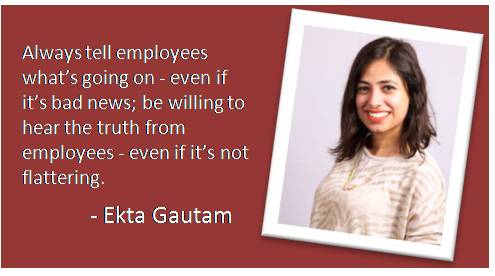Today, technology permeates every function of an organisation, and HR is no stranger to the use of technology.
Although “employee engagement” is one of the most popular workplace topics, it may only be a catchphrase at many companies. Not a new concept, it’s become more of a hot-button issue as the job market improves.
LinkedIn says the percentage of people open to changing jobs has spiked in the past four years, with 87 percent of professionals reporting they are open to speaking with a recruiter.
Millennials – who will account for 75% of the workforce in 2025 – are not motivated by money. They want to work with a purpose, and they want their workplace to be aligned with their values. Research shows that Millenials have a shorter average tenure and less feelings of corporate loyalty than previous generations. In fact, 60 percent of Millenials have changed jobs between one and four times in the last five years.
According to a 2015 Gallup Poll, only 31.5% of workers report being engaged. The Gallup Poll also reveals that Millenials are the least engaged generation in the workforce.
The future of work lies in empowering Millennial talent.
Creating a ‘desirable work environment’ begins with
- Don’t just talk about impact, make an impact
Millenials want to work for organisations that are transparent about using their technology, resources and talent. The best thing about impact is you can’t fake it. Recruiting the top talent of tomorrow begins with making a difference today
- Unleash the flow of information
Always tell employees what’s going on – even if it’s bad news. And, the leaders should want to hear the truth from their employee – even if it’s not flattering. If employees are not penalised for pointing negatives, it fosters an environment where employees feel that they have a real voice. Millenials want to be treated as collaborators, not underlings.
- Create opportunities for mentorship, skills acquisition and co-leadership
Allow good employees to develop their skills, and allow underperforming employees to improve their performance. It is important to make sure that the star performers know that they are stars. Millennials will work hard when you get serious about investing in their skills development. Young talent wants the opportunity to learn from someone with expertise; they want that on-the-ground experience to happen today, not tomorrow – and certainly not in five years.
- Ensure employees know their work matters
People need to see how their work contributes to the company’s success. By helping employees see how the work they do on a daily basis supports the company’s overall business strategy, they will likely feel more engaged. This is especially important to Millennials. A Harris Poll study conducted on behalf of Indeed revealed 51 percent of people age 18 to 34 said meaningful work was the factor that would most attract them to a job. That’s compared with 40 percent of people age 35 to 44.





Be the first to comment on "How are new age companies engaging with their employees?"